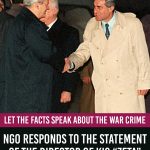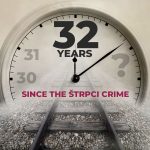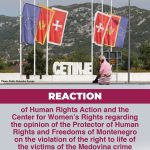30/ 10/ 2012 Conduct of Police Directorate members on the occasion of the basketball match
30/10/201206/12/2012 In Memoriam – Dragan Tumanovski
06/12/201222/ 11/ 2012 Press release regarding second first instance judgment in the “Deportation” war crime case
The manner in which this case has been processed to date shows, unfortunately, that Montenegrin judiciary still lacks sufficient knowledge, or willingness, to prosecute this war crime according to the international humanitarian law that is binding for Montenegro.
Omissions were evidently made in the very indictment starting from the fact that the accused were not charged for “taking hostages” – in spite of the letter of Mr. Nikola Pejaković, formerly Minister of Interior of the Republic of Montenegro (who replaced late Pavle Bulatović), who clearly indicated in August 1992 that the victims of deportation were arrested for the purposes of exchange of war prisoners, up to the fact that the conflict in Bosnia was treated as a “non-international conflict” although judgments of the ICTY and well known facts say otherwise. However, the trial chamber of the first instance High Court in Podgorica repeated mistakes in the interpretation of international law from its first judgment and those mistakes should have been avoided despite the indictment’s omissions.
In conclusion, on the basis of the existing indictment, the court had enough ground to bring a judgment for a war crime, and not to establish that, although illegal, actions of the accused could not be considered a war crime.
1. The Court found that in this case a war crime against the civilian population was not committed since the conflict in Bosnia was not of international character but non-international, as alleged in the indictment by the prosecution, while the existence of an international conflict, according to the court, is a prerequisite for the existence of that criminal act.
Even if it would be true that the conflict in Bosnia was not of international character (although the judgments of ICTY state otherwise), the actions for which the defendants were charged in this case are prohibited even in the case of non-international conflicts, i.e. they represent war crime against the civilian population. Actions for which the defendants were charged for are prohibited by Article 3, common for 1949 Geneva Conventions, as well as by the 1977 Second Additional Protocol. The international humanitarian law protects victims regardless of whether the armed conflict is international or non-international, and it is regrettable that the High Court is unaware of that.
2. The Court considers, we paraphrase, that the accused could not be perpetrators of a war crime because it was not proven that as MUP (Ministry of Interior) officers they were members of the armed forces of conflicting parties, or that they were in the service of either of conflicting parties.
For a committed act to be characterised as “was crime“ it is not important whether the perpetrator is a member of the military, political or administrative organization of the conflicting party or not, but it is important that “ the existence of an armed conflict have played a substantial part in the perpetrator’s ability to commit it, his decision to commit it, the manner in which it was committed or the purpose for which it was committed“, as concluded in Hague Tribunal (ICTY) judgment in the case Prosecutor v. Dragoljub Kunarac and others, judgment of the Appeals Chamber, 12 June 2002, para 58. All of these conditions for the existence of war crime in this case have been met. In particular, the aim with which the crime was committed was significantly associated with an armed conflict, as the arrest of refugees and their surrender to Bosnian Serb forces were committed in order for victims to serve for “the exchange for captured Serbian territorial fighters,” as written, with the stamp of the Ministry of Interior, to the wife of deceased Alenko Titorić, on 12 August of the same 1992, by minister Nikola Pejaković. Hereby the accused acted “in the service” (as formulated by the High Court) of the Bosnian Serbs, a party to the conflict in Bosnia and Herzegovina. HRA emphasizes that the status of the perpetrator is not a criterion for committing a war crime.
3. In contrast to the court attitude, which found that “it was not proven that the deportation victims were refugees”, HRA believes that the refugee status of the deceased victims of this crime is a notorious issue and to prove it, according to the international law, stamped confirmation was not required, although victims in general did have certificates by the Red Cross. Even if the High Court was right to doubt that the victims had been refugees, this should not have had affected the conclusion that a war crime had been committed against them as civilians, who had not participated in the hostilities. HRA emphasizes that the Montenegrin Civil Court concluded that victims were civilians in all judgments for damage compensation that had become final do date, which makes the conclusion of the Criminal Court even more astonishing.
We reiterate conclusion from our press release published on the occasion of first instance judgement:
If this verdict becomes final, finding that the crime of deportation cannot be considered a war crime, despite official recognition of state participation in the conflict in Bosnia and Herzegovina, it will provide an irreparable blow against Montenegro as a state of law.







 English
English